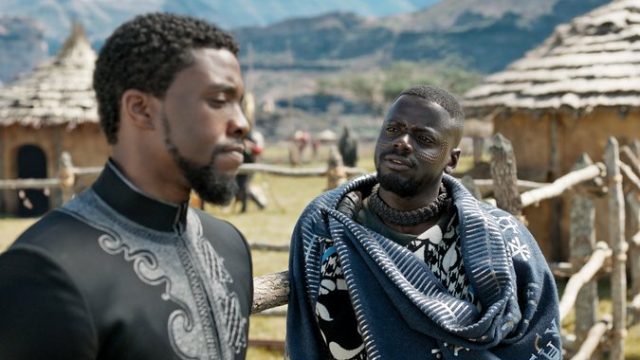I got to see Black Panther this week, after much expectation and anticipation. Mind you, I only saw Thor: Ragnarok last week, when we bought it on DVD, because we’d been unable to get a babysitter during its entire theatrical run. However, this meant that I was able to closely compare the two most recent MCU movies, and especially given that there is no character overlap, I would almost say that it would be possible to believe they were unrelated completely, if you somehow came to them without knowledge of the MCU. (An experiment we will only be able to run when we find someone who’s been in a cave for five years who wasn’t a comic book fan going in.) However, people still will insist that all Marvel movies are exactly the same.
And, yes, there are some overarching themes that the movies have in common. I’ve been saying for years that the driving force of the MCU is Daddy Issues, and one of the most interesting developments in Civil War was Tony Stark’s Mommy Issues added on to his preexistent Daddy Issues. This goes back to Iron Man and isn’t likely to change any time soon. But it seems to me that most of what these movies have in common are not MCU limitations but genre expectations—and the worst of these aren’t even limited to comic books but have a lot to do with the industry’s expectations that the average filmgoer is a teenage boy. Who is probably white.
I mean, we all know that’s why we still haven’t had a female-led MCU movie; Everyone Knows that girls don’t watch superhero movies. Heck, Deadpool ran commercials suggesting you lie to your girlfriend and persuade her that it’s a romance so she’ll go see it with you. Which is offensive on several levels, and frankly what would have really been subversive is if they’d bluntly marketed the movie to female comic book fans in an acknowledgement that they exist. After all, it does have four major female characters, though they are barely even in the same room with one another, as I recall. Some of the awkwardness of Iron Man 3 came from the belief that they wouldn’t be able to sell toys of a female villain.
And of course there’s the genre limitation that All Superhero Movies Are Action Movies. I’m not talking about replacing them with trade negotiations, surely everyone’s favourite part of the Star Wars prequels. I’m talking about how much people tend to like the bits of various genre stories that aren’t just people beating each other up. The schwarma scene in The Avengers, though given it has no dialogue, there’s no way to be sure that would be sustainable. Though there have been several Just Hanging Out scenes in the MCU that have worked; the Defenders spend an episode of their show in a Chinese restaurant, and that’s a good episode. If you’ve built your characters well enough, they shouldn’t have to be in an action movie to be interesting.
It’s not that I don’t like seeing Spider-Man sling webs. It’s that it’s interesting, to me at least, to speculate on what it takes for him to hide his secret identity from Aunt May. (Though one of the best pages in comics history indicates that he didn’t, at least not as well as he thought he did.) Most of Tony’s romance with Pepper happened off screen; there’s a lot of story we’re not being told. What does Steve Rogers like and dislike of what everyone keeps recommending to him? His keeping the notebook is a great touch, but what happens from there?
Or beyond that—what I condider one of the wasted opportunities of the Star Wars spin-off movies is that they’re telling us bits of story we already know details off. And I don’t just mean Expanded Universe, which isn’t canon anymore anyway. Okay, Rogue One did not actually, I don’t think, ever tell us what a Bothan was to die bringing the Rebel Alliance the Death Star plans. But we knew the plans would get to the rebels. We know Han Solo will end up on Tatooine at the right time to help Luke and Obi-Wan get off it. But what happens to other people in that universe? There’s a lot of story in that story that isn’t told, and we don’t just need to flesh out the bits that tie in to what we know.
One of the best episodes of Batman: The Animated Series involved the Joker trying to patent his fish. Just some poor schmuck whose day as a bureaucrat turned out to suck a whole bunch. Too late now, I suppose, but what was Harry Dean Stanton doing in that warehouse before Bruce Banner fell through the roof? We see a guy who got a contract to help clean New York, but there are stories like that all through extended universes, and we don’t see them, because they don’t follow the main plot. How do they make sure the Hogwarts Express isn’t followed and doesn’t hit other trains?
To me, this is a much greater limitation than any sort of imagined Marvel house style. Any studio that can produce the post-Cold War Cold War Thriller that is Winter Soldier, the Looney Tunes-inspired amusement that is Ant Man, and the Afro-futurism of Black Panther is doing okay. Better than the grimdark obsessions of various other cinematic universes, anyway. Our own expectations limit these movies as much as the studio. Though, sigh, Disney princesses all look roughly alike because of animators’ expectations of what attractive women look like, so I guess there’s still that to work on.
Buy me research materials like a copy of Coco; consider supporting my Patreon!

